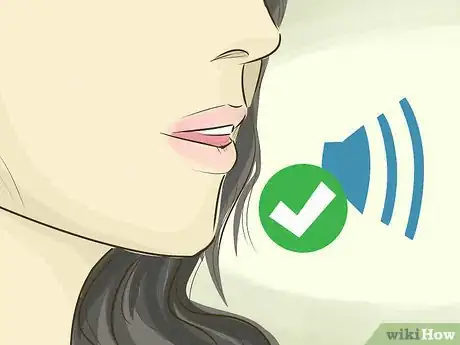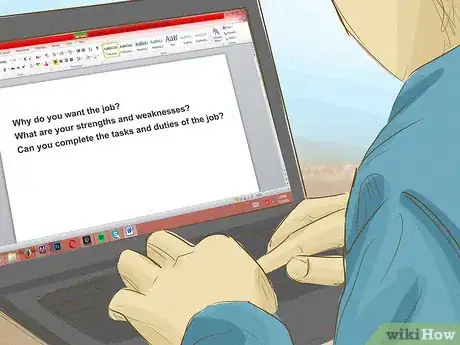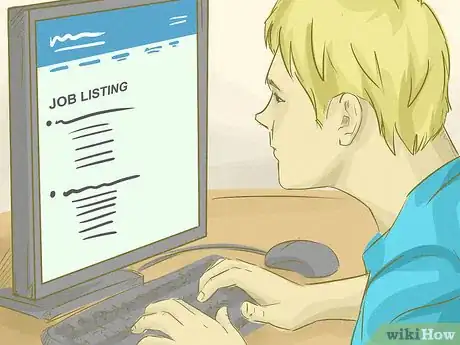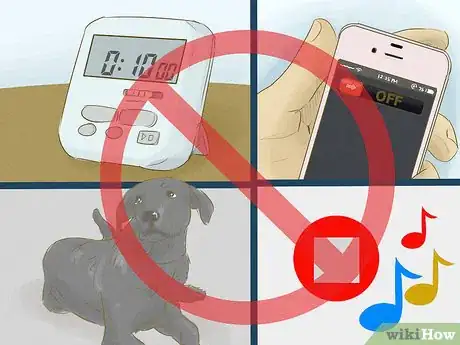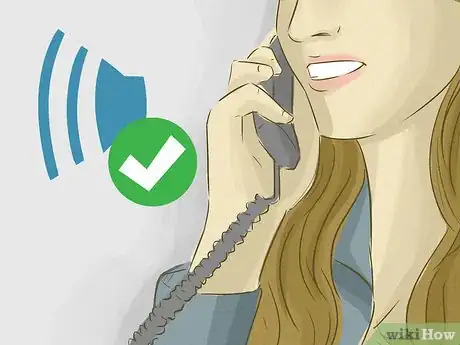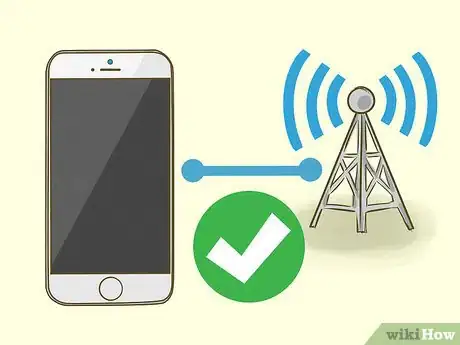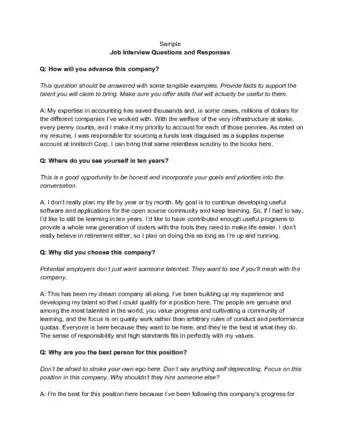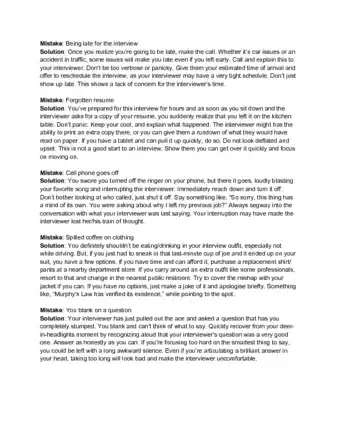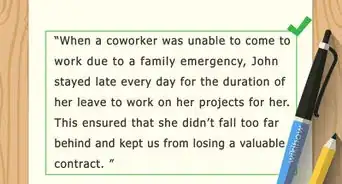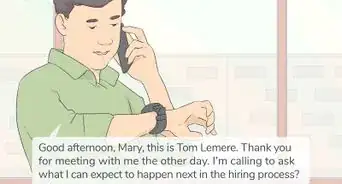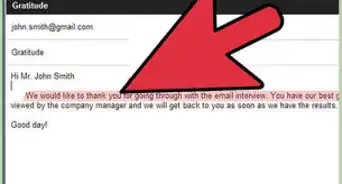This article was co-authored by Adrian Klaphaak, CPCC. Adrian Klaphaak is a career coach and founder of A Path That Fits, a mindfulness-based boutique career and life coaching company in the San Francisco Bay Area. He is also is an accredited Co-Active Professional Coach (CPCC). Klaphaak has used his training with the Coaches Training Institute, Hakomi Somatic Psychology and Internal Family Systems Therapy (IFS) to help thousands of people build successful careers and live more purposeful lives.
There are 16 references cited in this article, which can be found at the bottom of the page.
This article has been viewed 146,327 times.
An interview can be one of the most stressful things that you'll ever have to do. Many people haven't taken the time to evaluate themselves and put their skills and accomplishments into words. There are a multitude of questions that an interviewer could ask you and you may not be prepared to answer. However, if you conduct the right amount of research and adequately prepare for it, you'll be able to land the position that you want.
Steps
Answering Common Interview Questions
-
1Sell yourself. "Tell me about yourself" is one of the most common things someone will ask you on an interview.[1] While the question can seem overwhelming and open-ended, it's actually an excellent opportunity to sell yourself to your prospective employer. Think about the areas that you excel in and talk about experiences in which you used your skills to overcome a problem or solve an issue efficiently. Prepare a story before hand. Think about the skills that are required for the position you're applying to and frame your answers around what the employer is looking for.
- Other questions that allow you to sell yourself include, "Why should we hire you?" and "What are your greatest strengths?"
- When applying to a sales job, you can say something like, "I graduated from business school and got right into sales. I worked for Joe's Sales Inc. for three years before being promoted to sales lead. I consistently exceeded my quota and was the top in my team for most months out of the year. I have a love for communicating and closing deals."
-
2Keep your answers short and concise. If you plan on telling the employer a story about an experience which demonstrates your ability, make sure it has a clear beginning, middle, and end.[2] Do not respond with a long-winded story that has a lot of useless information. Concentrate on things that the employer wants in an employee.
- For instance, if an employer asks you to describe a challenging work situation and how you overcame it, you could say something like, "When I worked at Sue's Grocery we had a very limited budget and broken equipment. I was able to look at the expenses and came up with cost saving strategies that allowed us to reduce our payroll costs. This enabled us to take the extra money and repair the equipment we couldn't afford to fix."
Advertisement -
3Be specific about your experience. If you are applying for a highly technical position or a position that requires a particular type of experience, it's important to get into the details with the interviewer so that they know your experience is applicable and genuine. Communicate your experience in past jobs, where you've made mistakes, and how you've improved since then.[3]
- When going for a computer related job, make sure that you cite all the software and programming languages that you have experience using.
- When applying for a service industry job, knowing how point of sale systems and kitchen equipment works is a huge plus. Cite specifics.
- You can say something like, "I've worked with the POS system called Sales Force at the last restaurant and I worked in. I also have experience taking orders and using a deep fryer. I'm fast, clean, and committed to ensuring that the guest leaves happy."
-
4Demonstrate your mastery over the job. Show your knowledge of the terms regularly used in the industry by using buzzwords in the conversation. When you can speak casually about your skills and experience, it shows that you have the experience and know how to fulfill the tasks that you'll need to undertake.
- When going for a marketing job, make sure that you demonstrate your knowledge of both digital and traditional media. Cite all of the platforms that you have a following on and any networking connections that you may have.
- You can say something like, "I've worked with the Daily News, Inquirer, Local News, and the Chronicle with past events. I also have a huge following on Twitter and Instagram. I know how to determine trends before they trend."
- If you're a programmer you could say, "I've created layouts for websites, worked with PHP and CSS as well as Javascript and Ruby. I am really a big fan of responsive design and functionality when creating a website or app."
-
5Maintain confident body language. Body language is an important aspect of an interview. Sit up, with your back straight and your chest out. Crossing your arms or hunching over can make you appear not confident or closed off.[4] When your interviewer is talking, lean in, nod your head, and seem interested and engaged.[5]
- If you catch yourself slouching over or looking off into different directions, try to reset your behavior by consciously changing the way that you're sitting and interacting.
- When you first meet the person you're interviewing, it's customary to give them a handshake and to introduce yourself.
- Do not fidget or play with something while the interview is taking place. This can make you seem uninterested or distracted.
-
6Speak in a clear and confident tone of voice. Do not slur your words, use slang, or speak quietly when you answer questions on an interview. To speak confidently, make sure that your voice is at a reasonable volume for the interviewer to hear your responses without having to concentrate. Do not raise your tone at the end of sentences because it can sound like a question and make you seem not as confident.[6]
- Speaking loudly and clearly shows your authority over what you're talking about.
- Try to leave out filler words like "um" and "uh." Think of your responses before you start to talk.
-
7Maintain good eye contact. A lack of eye contact can make you seem like you're uninterested in what a person has to say. Try to maintain eye contact with the person interviewing you, but don't stare them down.[7] Break away from eye contact at times when you're thinking or responding to a question. Maintain a smile while you're looking at them to prevent yourself from looking confused or vacant.
- Try to be as natural as possible, but don't look away while the person is talking. This can be perceived as rude and ruin your chances on the interview.
- Another method is to draw a triangle on a person's face and adjust your gaze to each corner every ten seconds. This may make eye contact less awkward for you.[8]
-
8Don't be arrogant. Being overly confident can turn off a prospective employer and cost you the opportunity to work. Do not badmouth or complain about previous places of employment, because it could send a signal to your new employer that your attitude will not change. Never act like the job you're applying for is not good enough for you. Always remain optimistic and confident about the opportunity of your new employment.
- Instead of bad mouthing a previous employer, say something like, "I really enjoyed the people I worked with and the company itself. I felt like I was able to grow and learn a lot from those around me. While it wasn't everything that I wanted, it still gave me the mentality to succeed in the industry and I'm grateful for the experience there."
- Do not oversell yourself, or artificially inflate your accomplishments or ability. This could backfire if you actually get the job and are unable to fulfill your duties.
- To reaffirm interest in the job, you can say something like, "I think the company culture here is great, and I'd be grateful for the opportunity to work for you."
-
9Show your interest in working long-term. The cost of onboarding and training new employees can become expensive for a company.[9] Therefore, many businesses are looking to retain talent. A common question an employer will ask is "Where do you see yourself in five years?" Make sure that your answer involves where you'd be with the company you're applying to in five years.
- An answer to "Tell me about yourself" could be something like, "I hope to grow within my position here and take on more responsibility. I hope to learn a lot within the industry and become better at my job."
- A temporary or contract position could develop into a full time job.
Preparing For the Interview
-
1Research the company you are applying to. A common question that some companies may ask is, "What do you know about us?"[10] Take a look at the company website, and look at related news on the company. Having an understanding of things like what they do, their company culture, their values, and competitive advantages will enable you to cater your responses to fit what they are looking for.
- Being specific about the company will show the interviewer that you did your research and are serious about the job.
- Find things about the company that align with your personal interests. For instance, if you're interested in sustainability, see if the company you're applying to has a sustainability initiative and read about it.
- You don't need to memorize things like when the company was founded or specific details that don't go towards your position. While having this knowledge may impress an employer, concentrating on memorizing this information will give you less time to prepare for more critical aspects of the interview.
-
2Prepare answers for the interview beforehand. Preparation will allow you to have a good idea of how to respond to the most commonly asked interview questions. Not preparing could increase your anxiety on the interview and cause your answers to be confusing and not concise. Record your answers by writing them down or typing them out in a word processor.
- The most common interview questions include, "Why do you want the job?" "What are your strengths and weaknesses?" and "Can you complete the tasks and duties of the job?"
- Other questions may include, "Tell me about your past experience," "What is your biggest accomplishment?" "Are you a team player?" "Why should I hire you?" and "Why are you the best person for this position?"[11]
-
3Practice answering the questions in front of someone. Don't memorize answers verbatim; instead, get the general idea from the answers that you've recorded. Allow your answers to flow naturally by practicing with someone beforehand. Try to work on your tone by staying positive and matter-of-fact. Raising your pitch at the end of a sentence could show a lack of confidence, while a very low or monotone pitch may make you seem uninterested.
- Eliminate the amount you say "uh," "um," and "like."[12]
- If you forget an answer to a question, refer back to your answers. Keep in mind that you won't be able to use your notes for an in-person interview.
- Ask whoever is helping you practice to provide feedback after the faux interview.
-
4Think of questions to ask the interviewer. Typically an employer will ask you if you have any questions for them at the end of the interview. Take this opportunity to ask questions about your job or the operations at the company. Get specific and try to incorporate things that were explained during the interview. Not asking any questions shows a lack of interest and could hurt your chances of getting the job.[13]
- You could ask a question like, "So you said that I'd be writing headlines for new articles. Do you know what industry I'd be writing about?"
- Avoid asking questions about benefits packages or salaries before an official offer is made or the employer specifically asks you for salary requirements.
-
5Pick out your outfit beforehand. Employers will want to see that you're put together and organized. Your dress and appearance will be the first impression that you give to a prospective employer, and could influence their decision when hiring you. Always dress up and try to wear your best clothes even if the position is not in an office setting.
- Avoid loud and flashy colors and any clothing that has text.
- When in doubt, always dress more conservatively.
-
6Look at the job application or listing again. Reading the job application or listing will refresh your memory. It's essentially what the employer is looking for and contains the essential skills and experience that you should have. Reading it again will also give you the opportunity to spot details about the job that you may have missed when you applied initially.
Answering Questions on a Phone Interview
-
1Turn off distractions. If you're not used to working at home, then your environment may not be well-suited to take an interview over a phone call. Make sure to turn off any music, television, or alarms that may interrupt the interview.[14]
- If you have children or pets, make sure they are in the other room so you can concentrate on answering the questions.
- Do not have an instant messenger or website open while answering questions on the interview.
- Get a pen and paper ready in case you need to write anything down. Keyboard clicks can be loud and distracting during an interview.
-
2Prepare a cheat sheet. A benefit of having a phone interview is that the employer won't be able to see you. This is a significant advantage because you can create a cheat sheet before your interview that will help you stay on track during the interview.[15] Your cheat sheet can include valuable information about the company or the position you're applying to. Also, you can have your pre-written answers in front of you.
- Do not respond to questions word for word by reading off your cheat sheet. Try to make your responses as natural sounding as possible.
- Hit the major points that you've outlined in your cheat sheet and adapt depending on the interviewer's questions.
-
3Speak clearly and enunciate your words. Because the interview is over the phone, your speaking demeanour becomes even more important. The person interviewing you won't have anything else to go on other than the sound of your voice and the way that you answer their questions. Do not mumble and speak loudly enough so the hiring manager can hear you. Make sure to pronounce words and take your time to think about your answers.[16]
-
4Listen and don't dominate the conversation. The person interviewing you may have a speech that's been prepared, so allow them to speak. Many times they will inform you about the company or describe the duties you'll need to fulfill in the position. Asking a few follow-up questions shows your interest and tells the interviewer that you're paying attention.
- While a silence may feel awkward, it's better than going on an unrelated tangent and dominating the conversation.
- Smile as you answer your questions. They won't be able to see it, but it will affect the way your voice sounds.[17]
-
5Take the interview seriously. A common mistake many people make on phone interviews is taking it too casually. Make sure that you're properly sitting at a desk and have gotten dressed for the day. The more ready you are, the more attentive and prepared you'll sound over the phone. Get in the right state of mind for the interview before your new employer calls you.[18]
- The way you look and feel dictates your energy level during a phone interview.
-
6Ensure that your phone and connection are reliable. A faulty phone or weak cellphone connection are terrible reasons for a phone interview to go poorly. Before you go on the interview, make sure that your phone is in good working order and that you have good reception in the area where you'll be taking the call.
Sample Questions and Answers
Expert Q&A
Did you know you can get expert answers for this article?
Unlock expert answers by supporting wikiHow
-
QuestionWhat are the basics I should be doing for an interview?
 Adrian Klaphaak, CPCCAdrian Klaphaak is a career coach and founder of A Path That Fits, a mindfulness-based boutique career and life coaching company in the San Francisco Bay Area. He is also is an accredited Co-Active Professional Coach (CPCC). Klaphaak has used his training with the Coaches Training Institute, Hakomi Somatic Psychology and Internal Family Systems Therapy (IFS) to help thousands of people build successful careers and live more purposeful lives.
Adrian Klaphaak, CPCCAdrian Klaphaak is a career coach and founder of A Path That Fits, a mindfulness-based boutique career and life coaching company in the San Francisco Bay Area. He is also is an accredited Co-Active Professional Coach (CPCC). Klaphaak has used his training with the Coaches Training Institute, Hakomi Somatic Psychology and Internal Family Systems Therapy (IFS) to help thousands of people build successful careers and live more purposeful lives.
Career Coach
-
QuestionHow do I show a company why they should hire me?
 Adrian Klaphaak, CPCCAdrian Klaphaak is a career coach and founder of A Path That Fits, a mindfulness-based boutique career and life coaching company in the San Francisco Bay Area. He is also is an accredited Co-Active Professional Coach (CPCC). Klaphaak has used his training with the Coaches Training Institute, Hakomi Somatic Psychology and Internal Family Systems Therapy (IFS) to help thousands of people build successful careers and live more purposeful lives.
Adrian Klaphaak, CPCCAdrian Klaphaak is a career coach and founder of A Path That Fits, a mindfulness-based boutique career and life coaching company in the San Francisco Bay Area. He is also is an accredited Co-Active Professional Coach (CPCC). Klaphaak has used his training with the Coaches Training Institute, Hakomi Somatic Psychology and Internal Family Systems Therapy (IFS) to help thousands of people build successful careers and live more purposeful lives.
Career Coach Explain how you fit their needs. You need to be able to articulate why you're a good fit for this role and how you meet the requirements. One way to do this is to research the job before your interview. Then, position your past job experience and your abilities so they're appropriate to the job you're applying for. That way, you'll look like a perfect match.
Explain how you fit their needs. You need to be able to articulate why you're a good fit for this role and how you meet the requirements. One way to do this is to research the job before your interview. Then, position your past job experience and your abilities so they're appropriate to the job you're applying for. That way, you'll look like a perfect match. -
QuestionHow do I prove to an interviewer that I have the experiences and abilities to do well in a job?
 Adrian Klaphaak, CPCCAdrian Klaphaak is a career coach and founder of A Path That Fits, a mindfulness-based boutique career and life coaching company in the San Francisco Bay Area. He is also is an accredited Co-Active Professional Coach (CPCC). Klaphaak has used his training with the Coaches Training Institute, Hakomi Somatic Psychology and Internal Family Systems Therapy (IFS) to help thousands of people build successful careers and live more purposeful lives.
Adrian Klaphaak, CPCCAdrian Klaphaak is a career coach and founder of A Path That Fits, a mindfulness-based boutique career and life coaching company in the San Francisco Bay Area. He is also is an accredited Co-Active Professional Coach (CPCC). Klaphaak has used his training with the Coaches Training Institute, Hakomi Somatic Psychology and Internal Family Systems Therapy (IFS) to help thousands of people build successful careers and live more purposeful lives.
Career Coach Use specific examples that show your ability and experience. If the interviewer asks you about a certain skill or strength, tell a story that demonstrates a time you used that skill in a previous job. Stories are proof, and they're memorable. Don't just say you're an excellent problem-solver—give an example of a challenging problem that you solved and the impact it had on the company.
Use specific examples that show your ability and experience. If the interviewer asks you about a certain skill or strength, tell a story that demonstrates a time you used that skill in a previous job. Stories are proof, and they're memorable. Don't just say you're an excellent problem-solver—give an example of a challenging problem that you solved and the impact it had on the company.
Interview Tips and Tricks
References
- ↑ https://collegegrad.com/jobsearch/mastering-the-interview/ten-tough-interview-questions-and-ten-great-answers
- ↑ https://www.fastcompany.com/3060011/how-to-be-a-success-at-everything/how-you-should-answer-the-10-most-common-interview-questio
- ↑ http://theinterviewguys.com/top-10-job-interview-questions/
- ↑ https://www.monster.com/career-advice/article/body-language-can-make-or-break-a-job-interview-hot-jobs
- ↑ http://mashable.com/2014/11/17/body-language-job-interview/#NJBfAzuqOsqJ
- ↑ http://time.com/2820087/3-speech-habits-that-are-worse-than-vocal-fry-in-job-interviews/
- ↑ http://articles.chicagotribune.com/2013-08-05/classified/chi-eye-contact-job-interview-20130805_1_eye-contact-job-interview-someone
- ↑ https://www.themuse.com/advice/the-secrets-to-making-nonawkward-eye-contact
- ↑ https://www.zanebenefits.com/blog/bid/312123/employee-retention-the-real-cost-of-losing-an-employee
- ↑ https://www.job-hunt.org/recruiters/smart-job-interview-answers.shtml
- ↑ http://www.forbes.com/sites/deborahljacobs/2014/05/27/how-to-ace-a-phone-interview/#1449256655a4
- ↑ http://www.gcflearnfree.org/interviewingskills/what-to-do-during-an-interview/2/
- ↑ https://www.livecareer.com/quintessential/interviewing-dos-donts
- ↑ http://www.forbes.com/sites/deborahljacobs/2014/05/27/how-to-ace-a-phone-interview/#1449256655a4
- ↑ http://www.monster.com/career-advice/article/interview-cheat-sheet
- ↑ http://theinterviewguys.com/phone-interview-tips/
- ↑ http://theinterviewguys.com/phone-interview-tips/
- ↑ http://www.monster.com/career-advice/article/mastering-the-phone-interview
About This Article
To answer interview questions, make sure to prepare your answers beforehand to common questions, like “Tell me about yourself.” Additionally, rehearse talking about the areas you excel in and focus on skills that are required for the position you’re applying for. Then, prepare a story describing how you used your skills to solve a problem that directly relates to the position you’re applying for. You should also visit the company’s website so you can cater your answers to fit the company’s values and work culture. For more tips, like how to prepare for a phone interview, read on!





